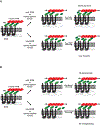Dynamic molecular processes mediate cellular mechanotransduction
- PMID: 21776077
- PMCID: PMC6449687
- DOI: 10.1038/nature10316
Dynamic molecular processes mediate cellular mechanotransduction
Abstract
Cellular responses to mechanical forces are crucial in embryonic development and adult physiology, and are involved in numerous diseases, including atherosclerosis, hypertension, osteoporosis, muscular dystrophy, myopathies and cancer. These responses are mediated by load-bearing subcellular structures, such as the plasma membrane, cell-adhesion complexes and the cytoskeleton. Recent work has demonstrated that these structures are dynamic, undergoing assembly, disassembly and movement, even when ostensibly stable. An emerging insight is that transduction of forces into biochemical signals occurs within the context of these processes. This framework helps to explain how forces of varying strengths or dynamic characteristics regulate distinct signalling pathways.
Figures



References
-
- Orr AW, Helmke BP, Blackman BR, and Schwartz MA Mechanisms of mechanotransduction. Dev Cell 10, 11 (2006). - PubMed
-
- Chen CS Mechanotransduction - a field pulling together? J Cell Sci 121, 3285 (2008). - PubMed
-
- Geiger B, Spatz JP, and Bershadsky AD Environmental sensing through focal adhesions. Nat Rev Mol Cell Biol 10, 21 (2009). - PubMed
Publication types
MeSH terms
Grants and funding
LinkOut - more resources
Full Text Sources
Other Literature Sources

